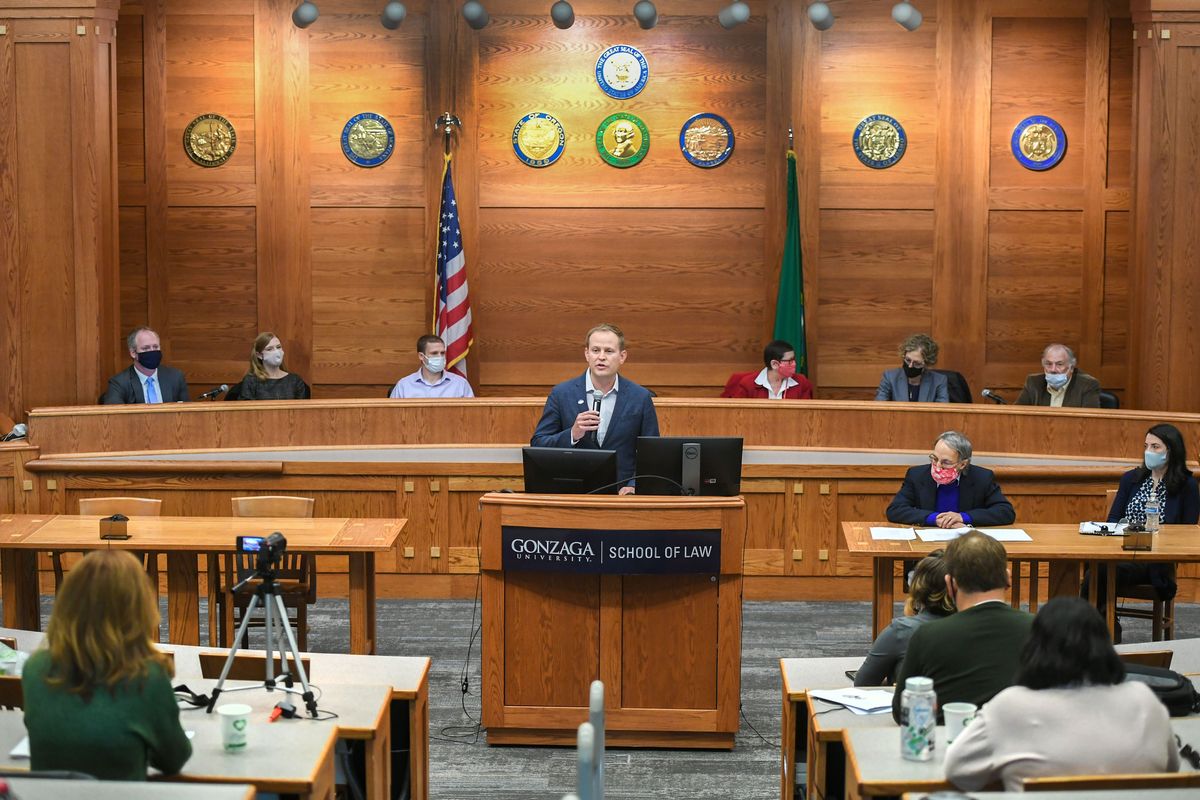‘Case of the century’: Lawyers, judges and journalists reflect on case of Kevin Coe, South Hill rapist, 40 years later

The passion remains 40 years later for two of the women at the center of the trial of Kevin Coe, the infamous South Hill rapist who is confined to a detention center for sexual predators in Western Washington.
“I viewed my role as the prosecutor as wearing the white hat,” said Patricia Thompson, who in the late 1970s was the only female prosecutor working under then-Prosecuting Attorney Donald Brockett, and who handled the Coe trial.
Julie Twyford, part of Coe’s defense team during that trial on six counts of rape that terrorized Spokane’s affluent neighborhoods, recalled the events differently, particularly the prosecution’s use of records related to an old shoplifting charge that were brought up against Coe at trial.
“It was to make the guy look bad,” Twyford said. “That line was crossed.”
The exchange was part of a three-hour continuing education symposium held at the Gonzaga Law School on Friday morning, 40 years removed from Coe’s shocking arrest in March 1981 as the man targeting and raping women and girls as young as 14.
Coe’s arrest came after investigators became aware of a pattern of attacks along bus routes in Spokane. Detective Rich Jennings, who joined the Spokane Police Department during Expo ‘74 and was moved to the rapist case from his role as a drug detective, remembered hiding in trees, looking for tails on “decoys” the department was using in an attempt to lure out the perpetrator. They’d also tagged a Chevrolet Citation belonging to the Coe family with a tracker.
“We would get up at 3:30, 4 o’clock in the morning, and I would try to triangulate with this device,” Jennings said.

Panels also included journalists from The Spokesman-Review and The Spokane Chronicle. Rick Bonino, who worked for The Spokesman-Review, said the paper’s work on the case caused the department to stonewall journalists.
“They stopped providing the media with any rape reports, and we regularly had access to all crime reports,” Bonino said.
The paper was publishing stories not in a desire to capture the rapist, but to illustrate how the Police Department was going about its investigation, said Shaun Higgins, who was the assistant managing editor of the paper at the time.
“It was our job to shine light on the Police Department and its commitment to finding the rapist,” he said.
Meanwhile, reporters and editors at the Chronicle were working for Coe’s father, Gordon, who was the managing editor of that paper.
“I come to work one day, and the headline says, in The Spokesman-Review, the ‘South Hill rapist has been arrested, and it’s our bosses’ son,” said Bill Morlin, who at the time was working as a reporter and editor for the Chronicle. “And we were all aghast. Gordon Coe wasn’t in the newsroom that day.”
Morlin remembered the No. 2 editor at the paper jumping on a desk and declaring that the Chronicle would cover the story without favoritism. He also remembered the shock of learning that the suspect had been his high school classmate at Lewis and Clark.
But the connection between the suspect and an editor at one of the city’s newspapers hadn’t gone unnoticed by the Spokane Police Department, Jennings said.
“I do have stacks of what we called squad reports. These were reports that were not filed with the records division,” Jennings said. “These were reports that were just kept internally.”
The squad was housed at a vacant home on the South Hill, Jennings said. Phones to and from the home were not linked with those of the police department.
“We had to be very careful about that, because Fred Coe’s father worked at (the Chronicle),” he continued, using the name Kevin Coe was known by prior to 1982. “So, we knew the potential was there for a leak.”
Coe’s initial conviction was overturned over concerns testimony was tainted by hypnosis. One of the convictions stuck through two appeals and is the reason Coe was imprisoned until 2008 and then sent to McNeil Island after a civil commitment trial.
Twyford said she believed the Coe family’s decision to have him admit to one of the rapes, in an attempt for confinement in a hospital and not prison after his initial conviction, is the only reason he remains in custody today. She called it “the case of the century in Spokane.”
“I think if this hadn’t happened,” she said, “the guy would have been out 40 years ago.”
That trial was overseen by Spokane County Judge Kathleen O’Connor, and covered by some of the same journalists who’d reported on the initial crime. Karen Dorn Steele, who joined the Spokane Chronicle following the rapes after a career in public television, covered the civil commitment trial for The Spokesman-Review. Both women served on the second of two law school panels Friday.
“By the time this third trial came along, attitudes toward women and rape had changed in our society,” Dorn Steele said. Both she and John Webster, the courts reporter for the Spokane Chronicle during the initial Coe trials, recalled the Spokane police lieutenant who suggested as a response to the rash of rapes that women should learn to “lay back and enjoy it.”
The purpose of the Friday symposium was not to glorify the case, said Jacob Rooksby, dean of the Gonzaga Law School, before the discussion began. The program included a moment of silence for victims and an actor reading a victim impact statement from one of Coe’s victims, who was 15 years old at the time.
“Victims of sexual assault are some of the bravest people I’ve ever known,” said prosecutor Thompson.
“You cannot have a sexual assault case without the victim.”